How to make Quick Pickled Vegetables! A simple, delicious recipe that can be used with almost any veggie! Make pickled cucumbers, pickled carrots, beets, turnips, radishes, kohlrabi, onions, cauliflower, peppers, asparagus or green beans. (For long-term canning, see recipe notes.)
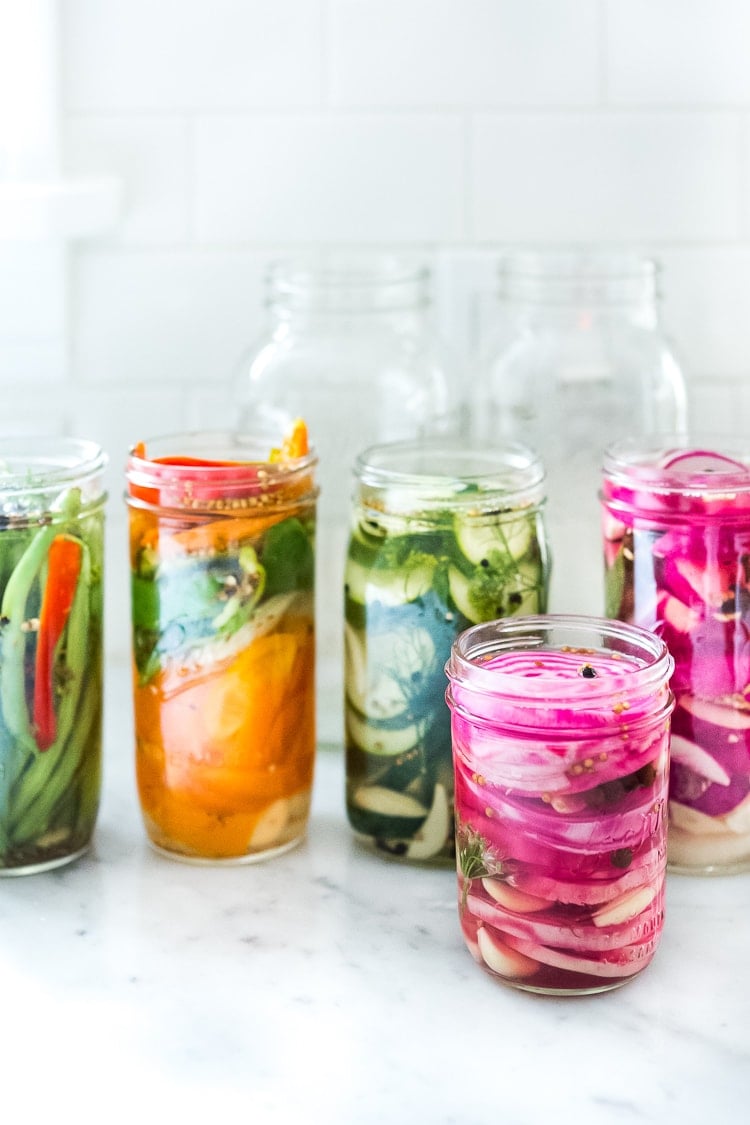
Here’s a simple recipe to help extend summer’s bounty well into fall. Our fridge has been bursting at the seams- full of so many beautiful vegetables we’ve been receiving through our CSA -that it was getting a little out of hand. I set some time aside to sort through all the drawers and gather up what could be preserved for later use.
Pickled Vegetables | 60-second video
What I love about Pickled Veggies
- The flavor. These quick-pickled vegetables are a little less vinegary by design. Sometimes I’ll get a hankering for a little snack and often turn to these pickled veggies because they taste great on their own, no need to bury them in a sandwich, which of course, you can always do too.
- Preserve the Veggies! One of the best parts of making pickled veggies is the joy and satisfaction it brings, knowing I saved the life of a vegetable before it was too late.
- Makes a great Hostess Gift! Bring a cute jar of quick pickled veggies as a hostess gift, such a treat!
What are the Best Vegetables to Pickle?
- Cucumbers
- Green beans
- Asparagus
- Baby Carrots
- Beets
- Salad Turnips
- Radishes
- Onions
- Chili Peppers and red bell peppers
- Zucchini and summer squash
Pickling Liquid
- Vinegar – white vinegar or white wine vinegar makes for the clearest color, but red wine vinegar, Apple cider vinegar, rice vinegar, or a combo will work.
- Water – to dilute the vinegar
- Salt – for flavor and to help preserve.
- Sugar- It helps to balance the vinegar flavor.
- Whole Spices – any of the following: coriander seeds, fennel seeds, mustard seeds, celery seeds, black peppercorns, allspice, clove, cumin seeds, dill seeds, star anise.
- Garlic cloves and Onion slices
- Fresh herbs– we love dill, but cilantro, basil works too.
See the recipe card for detailed measurements.
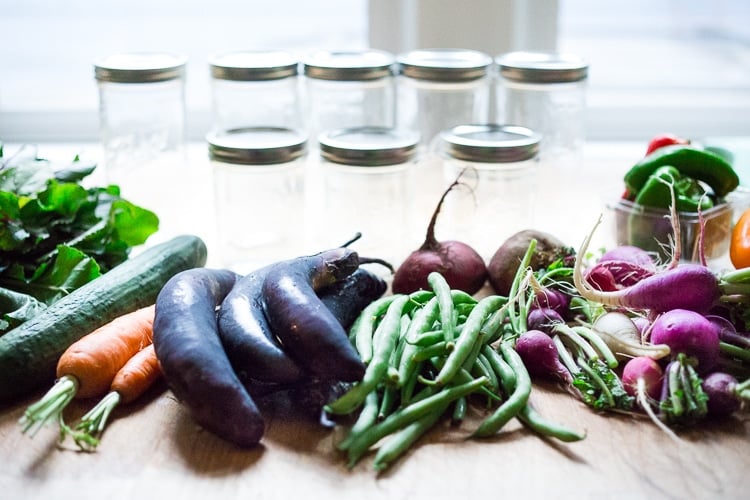
Optional Flavors and Variations
Play around and experiment with different spices and herbs.
- Whole Spices: Fennel seeds, Coriander, Cumin, Mustard, Anise Seed, Dill Seed, Peppercorns, Juniper Berries, Allspice, Whole Cloves, Star Anise,
- Aromatics: Onion, garlic, ginger, Turmeric root, Horseradish, lemon zest, orange zest, lime zest.
- Herbs: Dill, Parsley, Cilantro, Oregano, Basil, thyme, sage, rosemary, chives, scallions, bay leaves
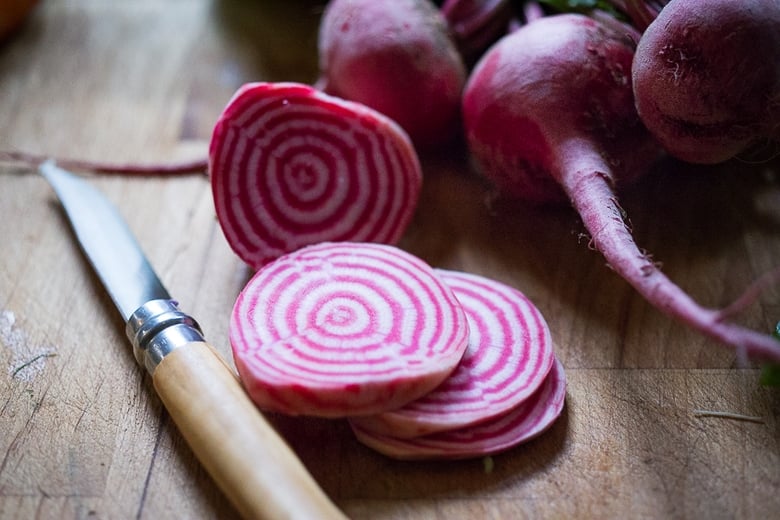
How to Pickle Vegetables!
Wash and prep your vegetables, taking the time to consider their beauty and perhaps how best to highlight their uniqueness. I wanted the colorful patterns of these Chioggia beets to really come through, so I sliced them very thinly, showing off their circles. This is the fun part!
Put on some good music and just create. It’s good for the soul!
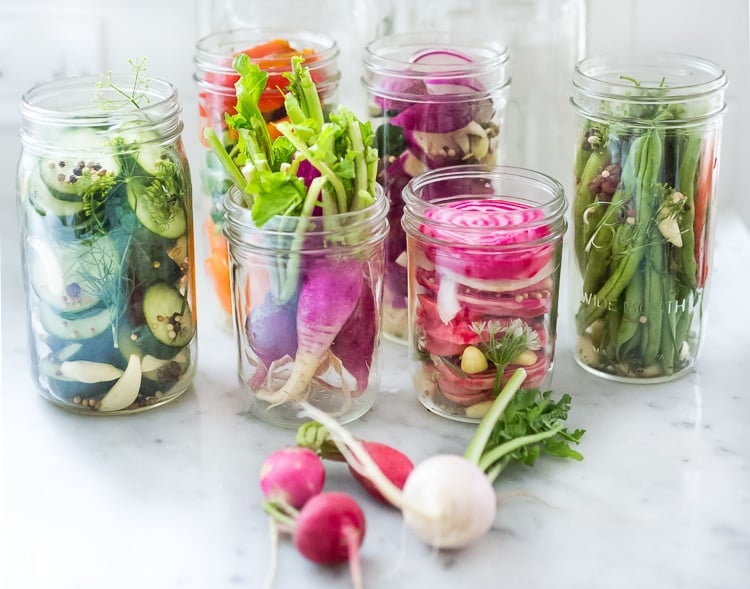
STEP ONE:
Begin filling up your mason jars with veggies, layering with whole spices, raw aromatics (onion, ginger, garlic) and herbs.
STEP TWO:
While you are filling the jars, heat the pickling liquid on the stove and bring it to a boil.
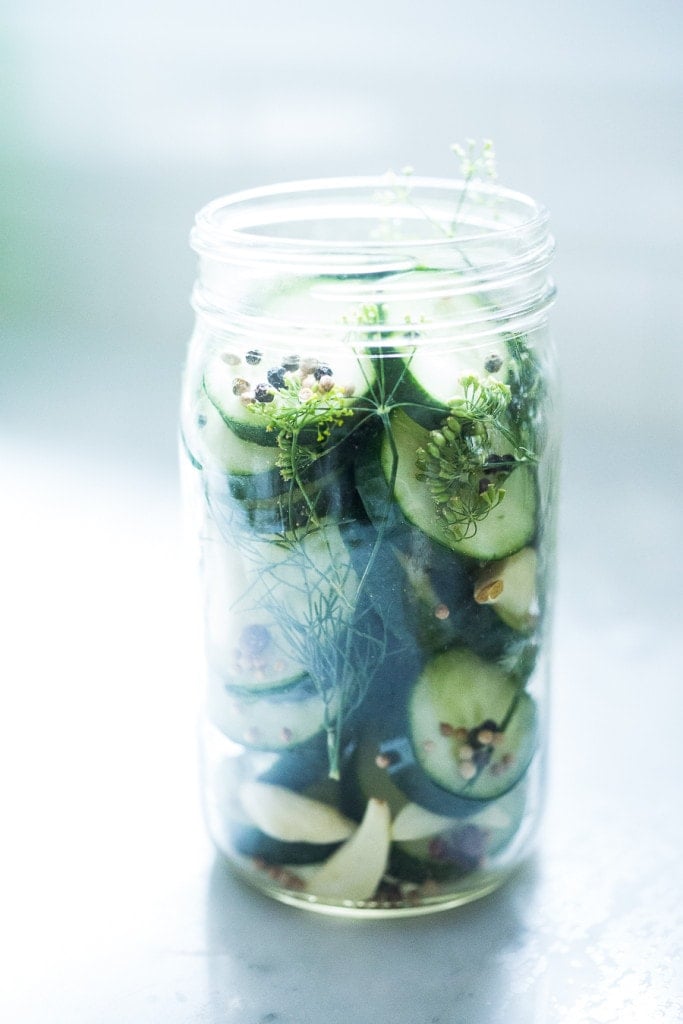
STEP THREE
Carefully pour hot the pickling liquid over the veggies, completely submerging. Leave about a ½-inch space between the top of the liquid and the lid.
STEP FOUR
Cool on the counter for a couple of hours before covering and placing the fridge.
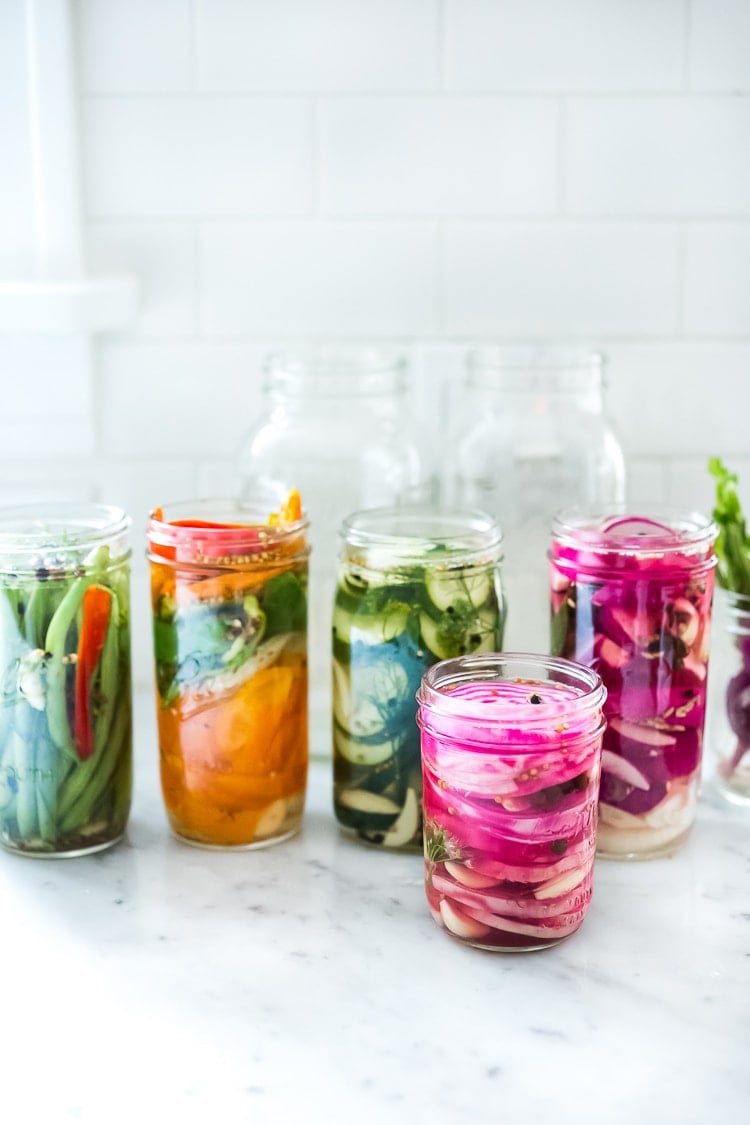
STEP FIVE
Refrigerate 12-24 hours. They will begin to have flavor the next day, and they will taste even better after a few days.
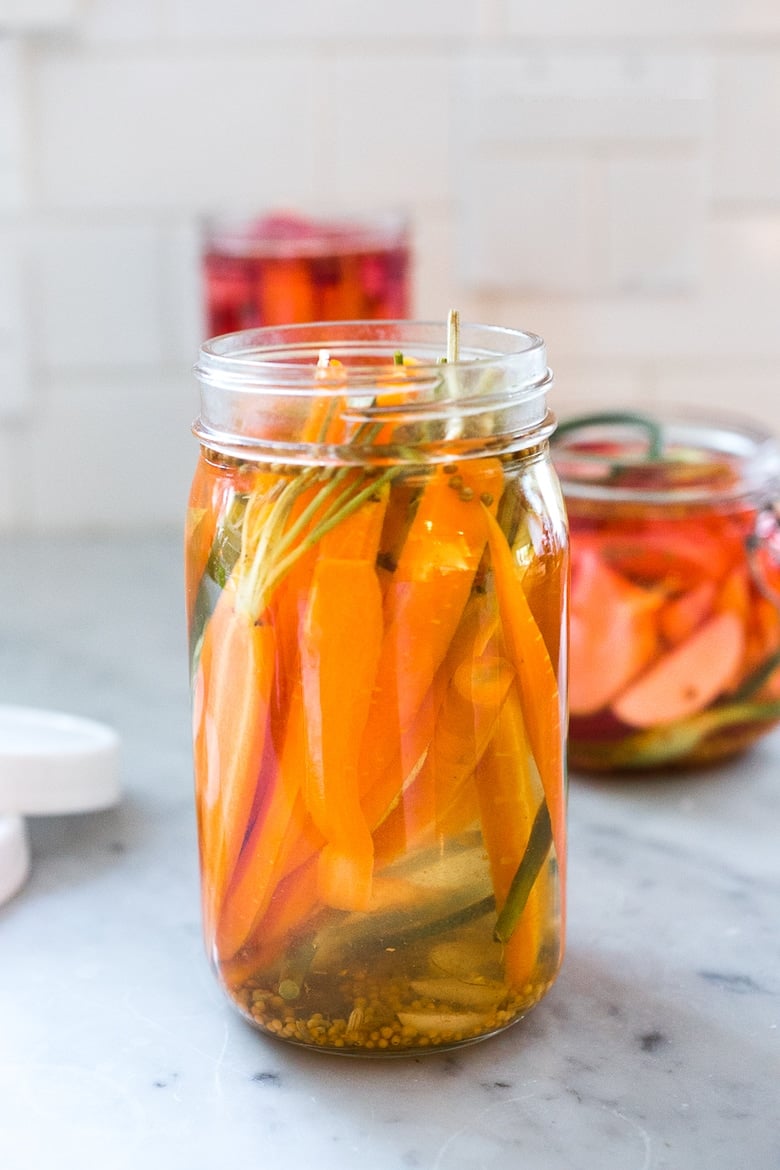
How Long Do Veggie Pickles Last?
These will keep up to 2 weeks in the fridge.
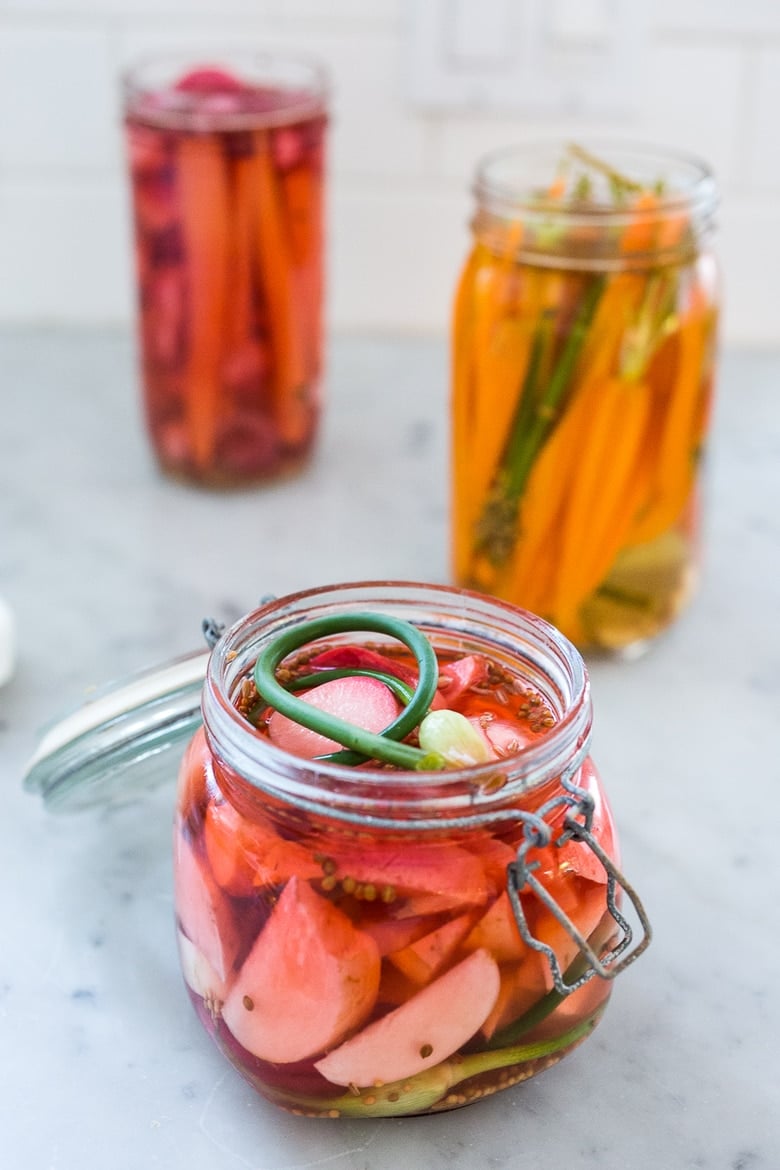
Other Pickles you may like
- If you are interested in pickling eggplant, here’s a tasty recipe for Moroccan Eggplant Pickles you may enjoy.
- Pickled Turnips are especially delicious with Middle Eastern food and I feature them here with my favorite recipe for homemade falafel and pita.
- Pickled peppers are great in sandwiches like this Falafel Burger (or any burger for that matter).
- Pickled Onions are a staple around here and we always have them on hand for tacos and sandwiches.
- Pickled summer squash are a way to extend the life of your zucchini
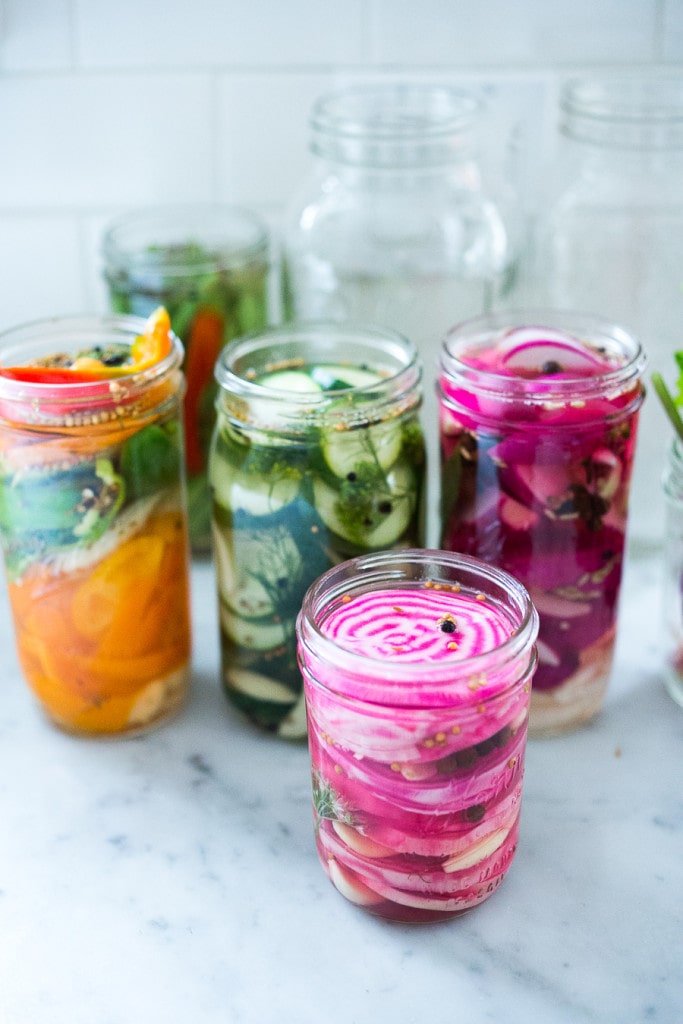
Enjoy these fun and easy refrigerator pickles!
xo
More PiCkling Recipes!
Love pickling and preserving? Here are more of our favorite recipes!
- Chow Chow
- Pickled Eggplant
- Pickled Red Onions
- Fermented Hot Sauce
- Easy Homemade Sauerkraut
- Tomato Confit
- How to make Preserved Lemons!
- Preserving Vegetables in Olive Oil
More from feasting at home
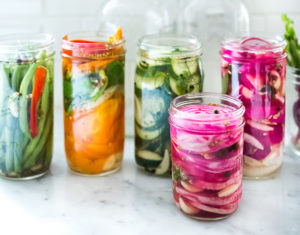
Quick Pickled Vegetables
- Prep Time: 15 mins
- Cook Time: 5 mins
- Total Time: 20 mins
- Yield: 2 Quarts
- Category: Pickled, Preserved , Snacks
- Method: Pickled
- Cuisine: Northwest
- Diet: Vegan
Description
Quick Pickled Vegetables – A simple, delicious recipe that can be used with any veggie! Beets, turnips, radishes, carrots, kohlrabi, onions, cauliflower, peppers, or green beans!
Ingredients
- Enough Fresh Raw Veggies to fill 2 Quart size mason Jars (about 5-6 cups)- cucumbers, beets, carrots, radishes, turnips, okra, green beans, asparagus, red onion, zucchini or summer squash, cauliflower florets, bell peppers, garlic scapes, fennel bulbs, rainbow chard stems
- 1 tablespoon coriander seeds
- 2 teaspoons fennel seeds
- 1 teaspoon mustard seeds
- 6- 10 cloves garlic- sliced thickly
- 1/2 an onion sliced (optional)
- few sprigs of fresh dill (optional) or other herbs
- Other optional additions- whole cloves, dill seeds, whole allspice, fresh ginger slices, fresh chilies or chili flakes, celery seeds, peppercorns, cumin seeds, star anise, other fresh herbs.
- 2 cups vinegar- white vinegar, red wine, rice wine, apple cider (any of these, or a combination)
- 2 cups water
- 2 tablespoons kosher salt
- 4-6 tablespoons sugar (or sugar alternative- remember, the sugar is added to balance the vinegar flavor, remember you won’t actually be consuming this.)
Instructions
- Prep your veggies. Wash them well and slice, quarter, or cut into spears, or leave whole ( like with green beans, asparagus, okra etc)
- Bring the water, vinegar, salt and sugar to a boil in a small pot, and in the meantime pack the jars with the prepped veggies.
- In two quart-size mason jars, divide the garlic and whole spices.
- Begin adding the veggies and if you are including the onion ( which I recommend), layer a few slices in with the veggies along with any fresh herbs you would like to include ( you can also layer the garlic this way too, or put it in first, your choice) leaving about an inch at the top of the jar.
- Using a funnel, carefully pour the hot liquid into the jars, making sure to submerge all the veggies, pressing down on them with the end of a wooden spoon. You may be able to add more veggies at this point, just make sure the liquid completely covers the veggies leaving at least a half-inch of room between the liquid and lid.
- Let sit on the counter to cool, and after an hour or two, cover and place in the fridge. These will taste good after 8-12 hours- but much better after a couple of days.
Notes
These keep up to 2 weeks in the fridge.
If pickling firmer veggies like carrots or beets, feel free to simmer the veggies in the pickling liquid (in a pot) for a 1-2 minutes to soften them slightly. Don’t overcook them!
If you are planning to can your pickles for long-term storage, bring a large pot of water to a boil and sterilize 2 wide-mouth pint jars and their metal lids.
Place the pickling liquid in saucepan over high heat and bring to a rolling boil. Pour the brine over the veggies filling each jar to within 1/2-inch of the top. Remove any air bubbles. Gently tap the jars against the counter a few times to remove all the air bubbles. Top off with more pickling liquid if necessary. Tighten the lids. Place the lids over the jars and screw on the rings until tight. For longer storage, place the filled jars in a boiling pot of water to can them. When the water comes back to a boil, boil the filled jars for 5 minutes then remove the jars immediately. Make sure the lids pop down.
Nutrition
- Serving Size: ½ cup – based on cucumber
- Calories: 13
- Sugar: 1.8 g
- Sodium: 291.7 mg
- Fat: 0.1 g
- Saturated Fat: 0 g
- Carbohydrates: 3 g
- Fiber: 0.3 g
- Protein: 0.4 g
- Cholesterol: 0 mg
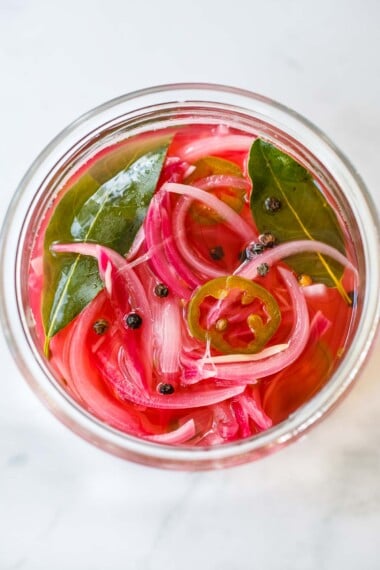
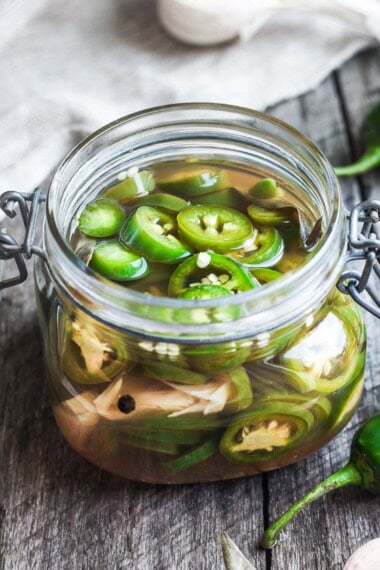
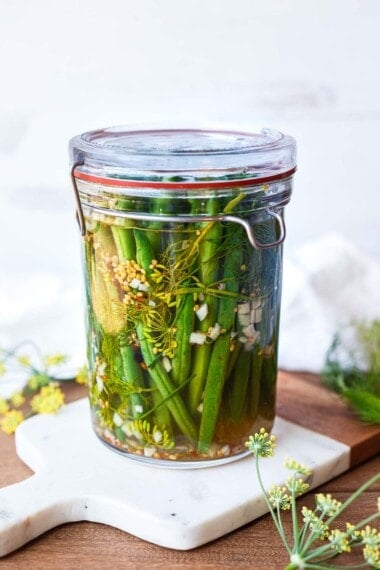
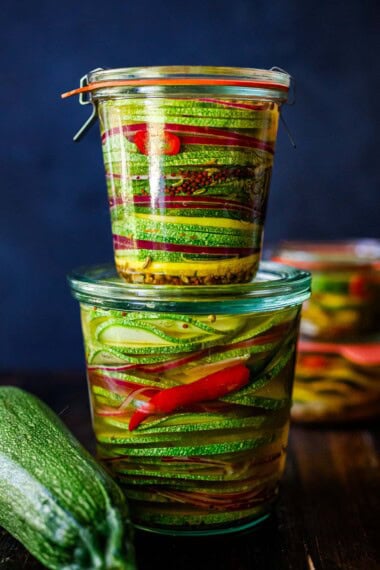
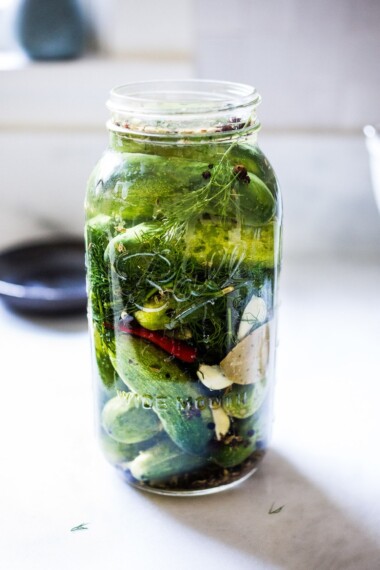
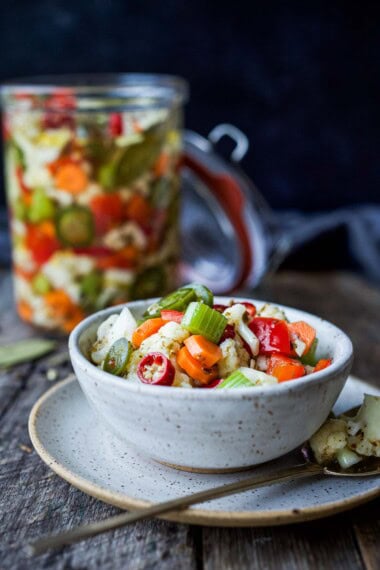
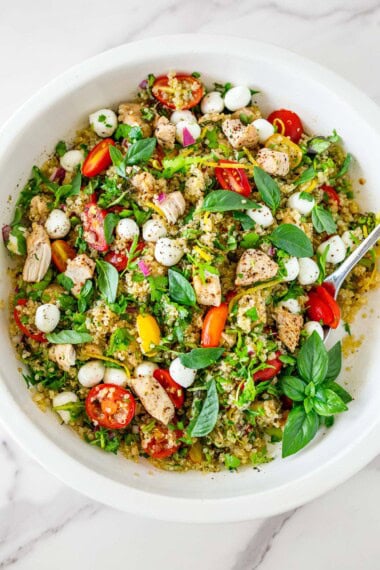
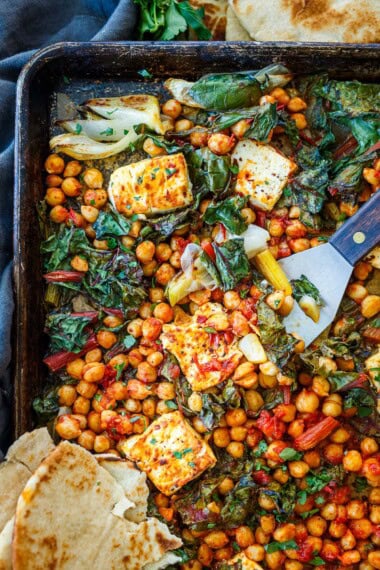
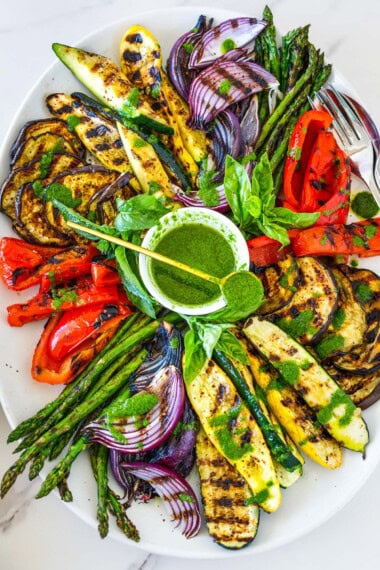

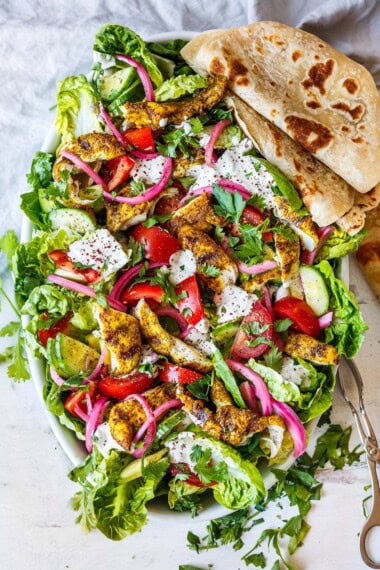
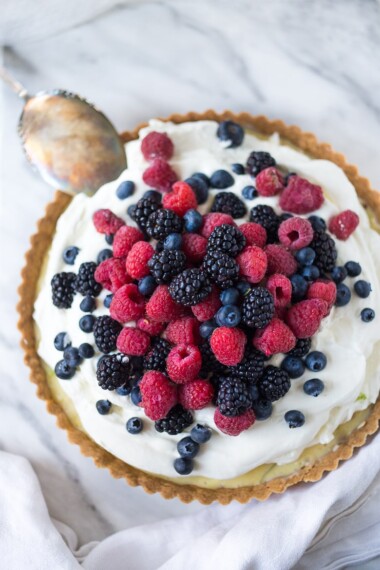
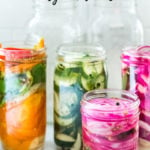
I could not find the pickling liquid ingredients?
Please scroll down to the recipe card at the very bottom!
I love this recipe! It’s so quick and easy to do. I made pickled carrots, cauliflower, cucumber, red onions, and beetroot. They all turned out good but the red onion was my favourite, it turned a pretty pink colour after steeping in the liquid for a few hours, and was simply delicious on fresh bread with vintage cheddar. So much better than store-bought pickles, this recipe is a keeper.
Thanks so much Tammy! Glad you enjoyed it!
Your advertisements take over the web page and I can’t read your recipe unless I respond to the ad.
Oh no Terry! That shouldn’t be. Do you know if it is the email-pop-up or an ad? Are you on a cell phone or computer?
I am using a laptop computer and it is an ad on the web page that expands and takes over the page. Perhaps I should spend time to cleanup my computer.
I will look into this!
Love this recipe- we make it all the time. You spices really elevate the pickling liquid!
Great to hear Ben! Spices make everything better. 😉
Loved the recipe, I had a lot of fun making it!
Thank you i
Great to hear!
Easy recipe to follow, the results are good, and it’s a great use for the carrots that couldn’t be persuaded to grow much in our weirdly-wintery spring down in VIC, Australia, this year. Thank you 🙂
Thanks Dawn!
Great recipe!!
Thank you!!
Thanks Theresa!
Easy recipe that I’ll make again and again.
Great to hear Hani!
Can a pickle veggies without salt? I’m on a salt free diet. I have saffron but I want to make sure it would still work. I love your site!!
Yes, it should be fine, and keep in mind, the pickles are not absorbing all the salt. It’s in the brine. I might up the vinegar by a couple tablespoons.
Can’t wait to try this! Is it possible to make this recipe without sugar?
Hi Jenny, the sugar really gives it a nice balance- to counter all the vinegar here. You could try lowering it a bit?
I love this, I had some extra veggies around so I went for a mixture of pickled veggies all together in a tuppaware container, I had great results with fridge pickled cucumbers and asparagus so far. I’ll come back with the feedback for these ones
Great Alina!
I make these all the time and have never cooked the pickling juice. I like the vegetables to be very crisp. I just mix it all in a bowl and once the sugar is dissolved, put it over the vegs in the jar. I shake them once in a while when I get into the frig. They are so good. I have to admit, I use a lot more sugar.☺
That sounds fine too!
How much more sugar do u use.
Awesome recipe! Turned out to be fantastic! I made it with cabbage, cauliflower, bell peppers, carrots, red onions, whole green chillies!, and cucumbers. The aromatics used were star anise, fennel seeds and coriander seeds. However, the addition of sliced garlic was definitely a stroke of genius 🙂 Thanks for such a simple yet beautiful recipe. I wanted to know if the pickling liquid can be reused? I have, sometimes, picked my baby carrots and cucumbers in the leftover pickling liquid from the store bought picked gherkins jar….was wondering if I could do the same with this leftover liquid too! Many thanks!
Give it a try- And perhaps add another splash of vinegar?
Thank you!
Hi Joanna, I have seen this Chinese lady claiming on the Internet that her pickling juice is 15 years old so I have reused my pickling juice a few times for thinly sliced cucumbers. They were delicious, but keep in mind I use the pickles within days so I’m not sure how long they would last long term. They are ready to eat after 24 hs, I keep them in the fridge and they are delicious. I had great results with asparagus spears too.
Hi, Just found your article when I was looking at making pickle at home. Very well written and worth reading this article. I am planning to make this with my sister.
Wish to see more in coming days
Good recipe and method. Just make sure the glass jars are not cold when pouring in the hot liquid, they can explode.
Is what I like its Look simple the recipe is simple anyone can do and im sure its delicious anytime any day.
I’d love to try this recipe! If I’d like to store them longer in jars would I do the same method as the canning but with jars instead?
Hi Kayley not sure if I understand you, but to be clear here, this is not a “canning recipe”, it’s strictly intended for the refrigerator. Canning requires specific acidity levels and this recipe is not designed for that.
Hi Sylvia! RE: canning. Your recipe looks perfect for canning! It has the recommended ratio of vineger to water which is 1:1. You would only need to point out to folks to make sure provided to use 5% acidity vinegar. Heres a link to the info on Ball/Mrs. Wages website https://www.healthycanning.com/acidity-of-water-and-vinegar-combinations-in-home-canning/
I found you looking for a tasty recipe for an end of summer garden veg mash-up! Thank you! 😃
Thanks so much Christine-appreciate this info!
Hi Kayley! This recipe is suitable for canning but make sure to use 5% Vinegar. Usually normal grocery store distilled white vinegar & don’t alter the vineger to H2O ratio. Look up water bath processing times but at sea level pints are usually 10 min/quarts 15 for pickles. Altitude adds more time. Check out Ball/Mrs Wages site below for info re: pretty much everything canning & tons of recipes.
https://www.healthycanning.com/acidity-of-water-and-vinegar-combinations-in-home-canning/
Hi! Are certain add-ons recommended for certain veggies?
It is fun to just play and experiment here- no rules, just have fun and try different things. 🙂
Hi there,
I’m searching about hot pickling try to find why every on says pouring hot pickling liquid make veggies crunch. It no one really Telling what makes it crunch? If you know the reason would you please let me know 🙂
Thank you!
Veggies keep their crunch when they are not boiled- so that’s why here, you want to pour the hot pickling liquid over the veggies but you don’t really cook or boil them unless you actually want them to soften a bit. Sometimes I’ll cook beets a bit to soften. But things like onions or cucumbers don’t need that.
It’s very good
If ya leave out the water and go with vinegar 5% acidity they will keep for 1 ta 2 years. bacteria con NOT grow in 5% vinegar
Right- you can leave out the water for sure, but I really prefer the milder less vinegary taste for everyday snacking.
I haven’t made this yet, but have a question. Would these vegetables have very much probiotics in them? I’m new to fermentation and want to use recipes to gain the probiotic benefits when eating them. I suppose there is some fermentation while in the refrigerator, but most fermentation recipes have the jars left out at room temperature for several days.
Hi Lorna- These are quick pickled veggies, not fermented veggies, so no probiotics here. Not even if left in the fridge. We do have a lot of fermented recipes on the blog though, just typ ferment in the search bar!
I used sliced green tomato and I can not stop eating them! So good!
YUM!
Where do the various seeds appear in the recipe please
STep 3. 🙂
Great recipe. I dud green beans, celery, carrots, onions asparagus and peppers. Quick question, can the brine be reused once? I did use the raw garlic.
These were amazing, did celery, red peppers carrots and asaparagus, added ginger and garlic. Can I reuse the brine one time?
I usually don’t- but you could try it and see what you think?
I reuse the brine to pickle eggs!